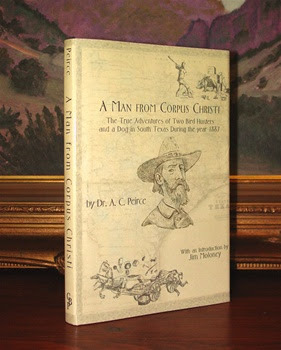Texans have always been eccentrics. In 1887, Dr. Arthur C. Peirce, a well-heeled physician from Boston, found that out when he ventured to Texas to do some bird hunting.
His guide through the brambles and bogs was John Marion Priour – an exceedingly able and decidedly Texan guide.
Here is a scene Dr. Peirce recorded in which he learned something of his guide’s peculiar beliefs…
A Canine Spook
By the middle of the afternoon San Bernard Creek appeared, and driving a short distance out of the road we camped in the swampy bottoms.
Although we had passed many cabins on our way, there were few of them near this stream. But if the settlers kept away from the creek, their dogs did not, and each inhabitant of the settlement was represented about our wagon by one of these animals.
Long, yellow, lank and hairless, these four-footed denizens flocked about us as though a part of our own family, and, figuratively, our dog Absalom took each of them by the hand and gave him a hearty welcome to the hospitality of our camp.
Like many people who had called upon us, these dogs could take no hint that they were not wanted, and in several instances the proverbial kick was attempted in order to keep them from overrunning us entirely.
Mr. Priour tried to punish one of the dogs which had his nose in our stew-pot. Several vigorous kicks were given in rapid succession.
To me, standing a short distance away, it appeared as if the man’s foot went right through the body of the animal, but the dog did not remove his nose from the dish nor did my partner’s foot meet with any resistance.
“Well, now, I’ll be dog-on’d,” said the unsuccessful kicker, “that’s the spookedest cuss that ever stole ham. It wa’n’t never meant for him to be killed, and we couldn’t do it if we tried. Now, you hear my words.”
“Why couldn’t we kill him? I don’t believe he could dodge a charge of shot.”
“Well, I wouldn’t kill that dog now for a million skunk skins.”
“Why not?”
“Why not! Why, I tell you, he’s some spiritual descension, and what’s more, he didn’t, dodge my foot either.”
“Yes, he did. You didn’t strike him.”
“I know I didn’t strike him.”
“Then he must have dodged you.”
“No, he didn’t dodge me.”
“What did he do then?”
“He just ghosted every time. Now, I’ll be dog-on’d if I don’t know it, and I’m going to keep him along with us for good luck.”
“He dodged your foot, for I saw him slide under it.”
“No, you didn’t see him slide under it. I’m no elephant, I know, but when my foot starts, it generally gets there except in spooks. I tell you, that dog just all goes into spook when he wants to, and you might as well strike at your shadow with a club.”
“I don’t believe in spooks.”
“Well, what of that! I knew a man once that didn’t believe in bulls till he had a two-foot horn run through him and was carried around on the bull’s head for a week. Then he just begun to believe in bulls.”
“Were you ever tackled by a spook?”
“No, but I’ve known them to scare a man to death who might just as well been horned by a bull.”
“Well, did you ever see a spook?”
“Yes, I’ve seen a spook!”
“Where was it?”
“Where I was living on the Aransas River.”
“What was the spook doing?”
“It cut around as though ’twas crazy; kept running and ramming into the fence, and brought up there kersmack every time. I thought once ’twas going to knock the boards all down.”
“What did it look like?”
“Looked like a big white goose.”
“Did anybody around there keep geese?”
“Yes, the man that lived near by had a whole pen full of them.”
“Wasn’t that a goose you saw?”
“No, ’twas a spook.”
“Why didn’t you run it down?”
“I did.”
“Did you catch it?”
“Of course I did. Did you ever know me to let a thing go when I once doubled down to get after it?”
“What did it look like after you’d caught it?”
“Looked like a goose just as it did before.”
“What did you do with it?”
“Picked the feathers off and had it for dinner next day. That’s what I did with it after I wrung its neck.”
“You stole a goose, that’s what your spook was.”
“No, ’twas a spook; but I tell you what, it looked and tasted so dog-on’d much like a goose that most anybody but me’d been deceived. But I took it for a spook when I first saw it, and I wa’n’t no such fool as to change my mind just because it had feathers; and besides there ain’t any law against stealing spooks.”
“I guess that was the same kind of a spook this dog ‘ll prove to be; one with something to it.”
“Well, don’t kill that dog anyway, he comes near enough a spook.”
This settled the question on the champion dodger, and he was allowed, during his new friend’s presence, various privileges refused other and less active visitors.

The story above is from Dr. Peirce’s book of Texas hunting tales.
He published it in 1894.
And nothing happened.
In fact, since we re-published it in 2008, more people have read it than in the previous 114 years.
It took the book over a century to find its audience: 21st century Texans.
This book comes with three promises:
1. You will laugh out loud
2. You will tell your friends about it
3. You will want to read it again
If that’s not the case, I’ll buy it back from you.
Categories: Texas Biographies, Texas Culture, Texas Folkways
